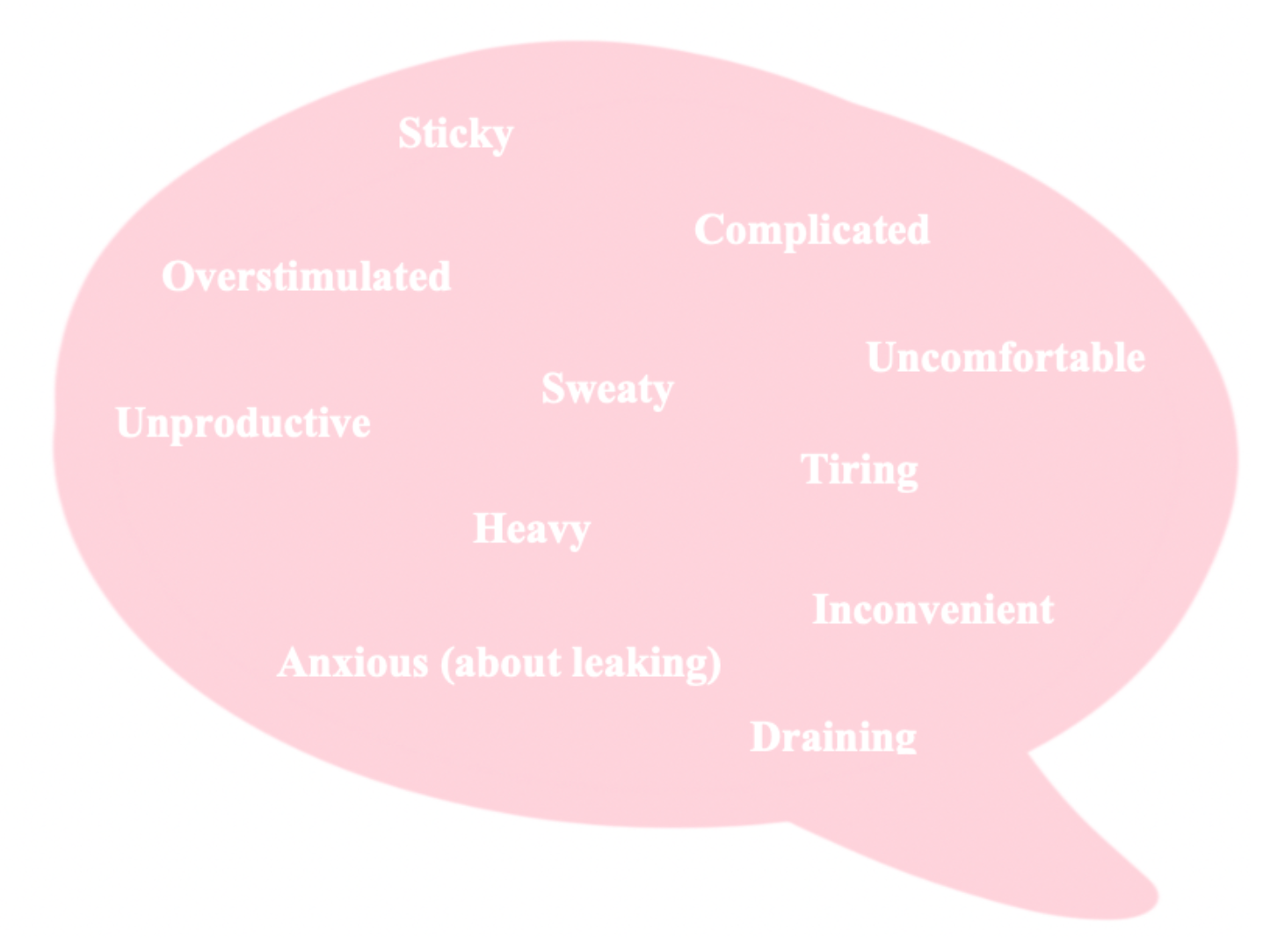Menstruating in Unconventional Spaces: The Hidden Labour of Bleeding Under the Sun
Sweating, cramping, worrying - midsummer menstruation is hardly a walk in the park.
No, periods are not objectively ‘worse’ in the summer. There is no correlation between sunlight hours and our cycles. But this is not to say that periods can’t feel worse in these months between spring and autumn. Of course, many menstruators might not think twice about having their period during summer, while others might go as far as to plan their holidays around their cycle. Everyone’s experience is different. To grasp a better understanding, I asked the Sanitree team to describe how they feel about menstruating in the summer using one word. These were our responses:
There are multiple reasons why a menstruator might find hot climates challenging. Biologically, during the luteal phase, there is a rise in progesterone, which leads to a rise in body temperature and can make hot weather feel harsher. Heat also increases fluid loss, which can worsen common premenstrual syndrome symptoms such as headaches, fatigue, and bloating. A study in southern regions of Saudi Arabia found that while hot weather doesn’t necessarily increase bleeding, it does amplify psychological symptoms, like mood swings, anxiety and tearfulness (Alqahtani et al., 2024).
On top of this, sweating and chafing can make wearing a menstrual product uncomfortable and can lead to irritation. To manage heat, wearing less layers of clothing can relieve symptoms, but this can also lead to worries about leaking and visible menstrual products. These anxieties echo the dominant narrative surrounding menstruation as unhygienic and something which must be concealed. So, is the real issue the hot weather itself, or the pressure for a menstruator to present a kind of sanitised femininity? Perhaps summer doesn’t create new struggles so much as it amplifies old ones. In this sense, hot climates could be seen to add an extra layer of ‘blood work’ to menstruator’s lives, and a layer that many may prefer to avoid.
And then there’s the beach. Speaking from personal experience, it can feel like one of the most challenging places to be on my period. The sand, the layers of sun cream, the lack of bathroom access, the heat, and the swimsuit attire can feel overstimulating — and frankly, like an unnecessary stressor. Yet too often, I find myself on the beach during my period, ignoring what my body truly needs, because of the comments: “You’re on holiday.” “Chill out!” “You can’t just stay in the hotel.” Sometimes these comments are an internal monologue, and other times I find myself being pressured by family or friends. Yet ultimately, this pressure to perform as though I’m not menstruating, to operate as a “non-menstruator”, can lead to guilt and shame when I don’t match up to the carefree holiday ideal. And it's not just the beach. Many activities, from swimming to sightseeing, can be exhausting when you are bleeding.
Although we frame holidays and hot climates as unconventional spaces for menstruation, it’s important to acknowledge that for many, this is not seasonal but an everyday reality. In regions where high temperatures are constant and WASH (Water, Sanitation and Hygiene) infrastructure is limited, heat and water scarcity make managing menstruation significantly harder. To position holidays as the “unconventional” context is, in many ways, a privileged perspective; it assumes access to choice, comfort, and relief that not everyone has. Here, the unconventional lies in the conversation: menstruating in warmer weather is rarely spoken about and under-researched. It is “unconventional” because it is not easy, and precisely for that reason, it is worth talking about.
While we’re not in the business of prescribing a one-size-fits all approach to managing periods and the matter is far more complicated than “drink more water!”, it would feel incomplete not to acknowledge some of the ways people might find relief during the summer months. This may include wearing breathable fabrics, staying in the shade during peak heat, carrying extra menstrual products, or cooling down with an iced drink. For some, hydration and balanced food choices may ease bloating or fatigue and for others, prioritising rest and using pain relief provides the greatest sense of comfort and control. Everybody is different, and it is important to find which strategies work for you.
Alqahtani, S.A.S.A., Hatim Tagalsir Osman, A., Alasmre, F.A., Alghamdi, R.F., Alasmre, H.A., Alasmre, L.A., ALMuqrin, F., Almuntashiri, A.A., Alshahrani, M.A. and Majrashi, M.M. (2024). Effects of Weather on the Severity of Menstrual Symptoms Among College- and High School-Going Women in the Southern Regions of Saudi Arabia. Cureus, [online] 16(8). doi:https://doi.org/10.7759/cureus.66786.
https://www.cosmopolitan.com/uk/body/health/a40622652/how-to-cope-in-heatwave-on-period/
If you enjoyed reading this article, check out the other ways you can support us:

